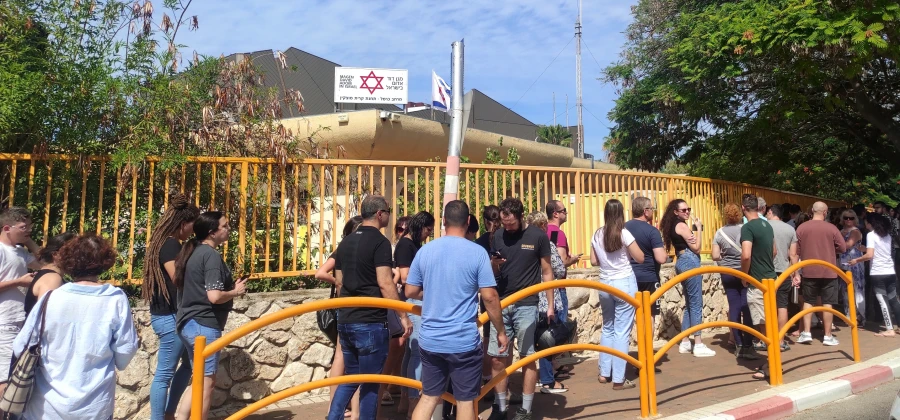
Last month Israel suffered the worst blow in its history, when Hamas terrorists breached the internationally recognized border and systematically tortured and executed more than 1,400 Israeli civilians, including small babies crying in their cribs, helpless grandmothers clinging to their walkers, and parents desperately shielding their children from the unimaginable.
There’s much we don’t know yet about how such an attack could occur, or how a genocidal terror group managed to overcome the sophisticated intelligence and defense systems put in place to prevent precisely this sort of attack. War in Israel is raging on, and there’ll be plenty of time to ask and answer these questions once it is over.
But here’s what I can tell you for certain: Start-Up Nation has just evolved into Rise Up Nation, powered not only by technological innovation but by enormous amounts of compassion, dedication, and commitment to see each other through this crisis.
Examples abound.
One major Israeli job site, usually a go-to place for programmers and engineers looking for their next career move, was converted into a platform for volunteers looking to find some way to help those families who had lost their home—or, worst, their loved ones—in the attack. A popular real estate site, usually a destination featuring slick photographs of pricey apartments, was turned into a site allowing anyone with vacant homes, or even rooms, offer anyone affected by the war a place to stay for free. Coworking spaces were converted into residential suites, with meeting rooms that once hosted business meetings quickly redone to welcome in frightened children and weary adults. And a few top coders got together and quickly designed and launched an app that lets anyone eager to make a donation to one of Israel’s hundreds of charities make sure that the organization they’re thinking of supporting is legit.
The list goes on, and it doesn’t extend solely to the high tech crowd. Go to any supermarket these days, and you’ll find that most essential supplies—canned goods, bottled water, batteries — are all sold out, purchased not by folks concerned about their own well-being but by people who then ship them to complete strangers living on the front lines of the war. And if you wanted to donate blood in Tel Aviv this morning, the line to do so was a third of a mile long, with local coffee shops and bakeries sending out free treats to the citizens doing their best to stand up for their neighbors in a time of supreme need.
Indication Of What The Future Holds
You hardly see this side of Israel among the grim reports of carnage and grief. And that’s a shame, because this massive mobilization of Israelis who just want to love each other and support each other in any way possible isn’t just a silver lining on an otherwise very dark cloud; it’s a pretty good indication of what the future holds. And the present, too: Despite a devastating attack that led to an all-out war, Israel’s economy, including its famed high-tech industry, plowed through, delivering when it mattered most and showing to the world what true grit looks like.

What does it look like? Immediately after the attack, Israeli companies, including many tech outfits, sprung to action. First, we made sure our employees were safe and cared for, and that they had the resources they needed to do their work in such tough times. And then, we proved, resoundingly, that even a devastating blow followed by a declaration of war could not slow us down a bit. Even, or especially, at a time of war, we made sure we didn’t skip a beat, meeting the same high standards when challenged by the reality on the ground.
This massive and stunning mobilization is no accident. Make no mistake about it: Israel did not become known as start-up nation merely because it could produce cutting-edge technologies. It grew, rapidly, into one of the world’s most innovative, and fastest-growing, economies by showing many of the same qualities you see on display all over the country these days. The ability to respond to crises by generating opportunities. The sense of urgency driving invention and imagination. The audacity to break a few rules here and there en route to a better reality. And, most importantly, a tremendous sense of purpose, rooted in the understanding that attacks, sadly, are a very real threat and therefore the solutions we come up with, the tools we build, the technology we generate, all are anything but theoretical.
Send Love
Keep that in mind if you’re trying to figure out what happens when this war ends. While we can’t tell how long it would last or what terrible price it will exact, we can pretty much say for certain that Israelis will soon direct the same energy and creativity and care they’re now investing in supporting each other towards rebuilding all they had lost, coming up with everything from advanced cyber technologies to applications that help people help each other.
And others are supporting us as well: When news of the attack broke, I was overwhelmed and deeply touched by how many individuals and organizations all around the world took the time to check in, send love, and donate money and resources to Israelis in need, and how many colleagues all over the world jumped in to make sure our shared enterprises don’t skip a single beat. In a globalized world, where innovation and growth depend on teams, customers, and investors working together across national and cultural boundaries, such empathy is not only heartwarming; it’s also an indication that Rise Up Nation has all the support it needs globally to continue and thrive once we recover from this blow.
I look forward to this peaceful day. And I hope, too, that just as so many looked up to start up nation for its dazzling economic success, so, too, will people now look at rise up nation for being able to mobilize they very same energies and skills not for profit but for good.
Merav Bahat is the CEO and co-founder of Dazz.





